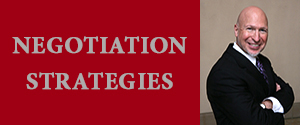

Introduction
Consider a negotiation where a land developer is negotiating with a building contractor to build a development of townhouses to rent or sell. Negotiations are going well until the developer demands a clause for an enormous liquidated damages penalty if the project is not completed on schedule. The contractor now feels exploited and pushed towards what he perceives to be an unfair and unbalanced contract. The developer is adamant that because of previous experiences with contractors and losses he has suffered due to delays, he will not agree to a contract without a heavy liquidated damages clause.
The contractor will likely see his current problem in the negotiation to be how to eliminate the liquidated damages clause, while the developer sees his problem as how to convince the contractor to accept an unreasonable liquidated damages clause.
Typically, as in this example, there is no joint, intersecting definition of the problem to be solved, but rather parallel and polarized definitions as each sees his problem from his particular perspective. Furthermore, both contractor and developer in this case, have framed their respective problems in very narrow, limited and zero-sum-like contexts which often leads to sub-optimal outcomes at best and impasse at worst.
How we frame and define the negotiation problem that needs to be solved if parties are going to agree, can frequently make the difference between agreement and impasse.
NAFTA - A Live Case Study
This week, the NAFTA (North American Free Trade Agreement) renegotiation is entering its fourth round of talks in Washington D.C.
Consider a negotiation where a land developer is negotiating with a building contractor to build a development of townhouses to rent or sell. Negotiations are going well until the developer demands a clause for an enormous liquidated damages penalty if the project is not completed on schedule. The contractor now feels exploited and pushed towards what he perceives to be an unfair and unbalanced contract. The developer is adamant that because of previous experiences with contractors and losses he has suffered due to delays, he will not agree to a contract without a heavy liquidated damages clause.
The contractor will likely see his current problem in the negotiation to be how to eliminate the liquidated damages clause, while the developer sees his problem as how to convince the contractor to accept an unreasonable liquidated damages clause.
Typically, as in this example, there is no joint, intersecting definition of the problem to be solved, but rather parallel and polarized definitions as each sees his problem from his particular perspective. Furthermore, both contractor and developer in this case, have framed their respective problems in very narrow, limited and zero-sum-like contexts which often leads to sub-optimal outcomes at best and impasse at worst.
How we frame and define the negotiation problem that needs to be solved if parties are going to agree, can frequently make the difference between agreement and impasse.
NAFTA - A Live Case Study
This week, the NAFTA (North American Free Trade Agreement) renegotiation is entering its fourth round of talks in Washington D.C.



